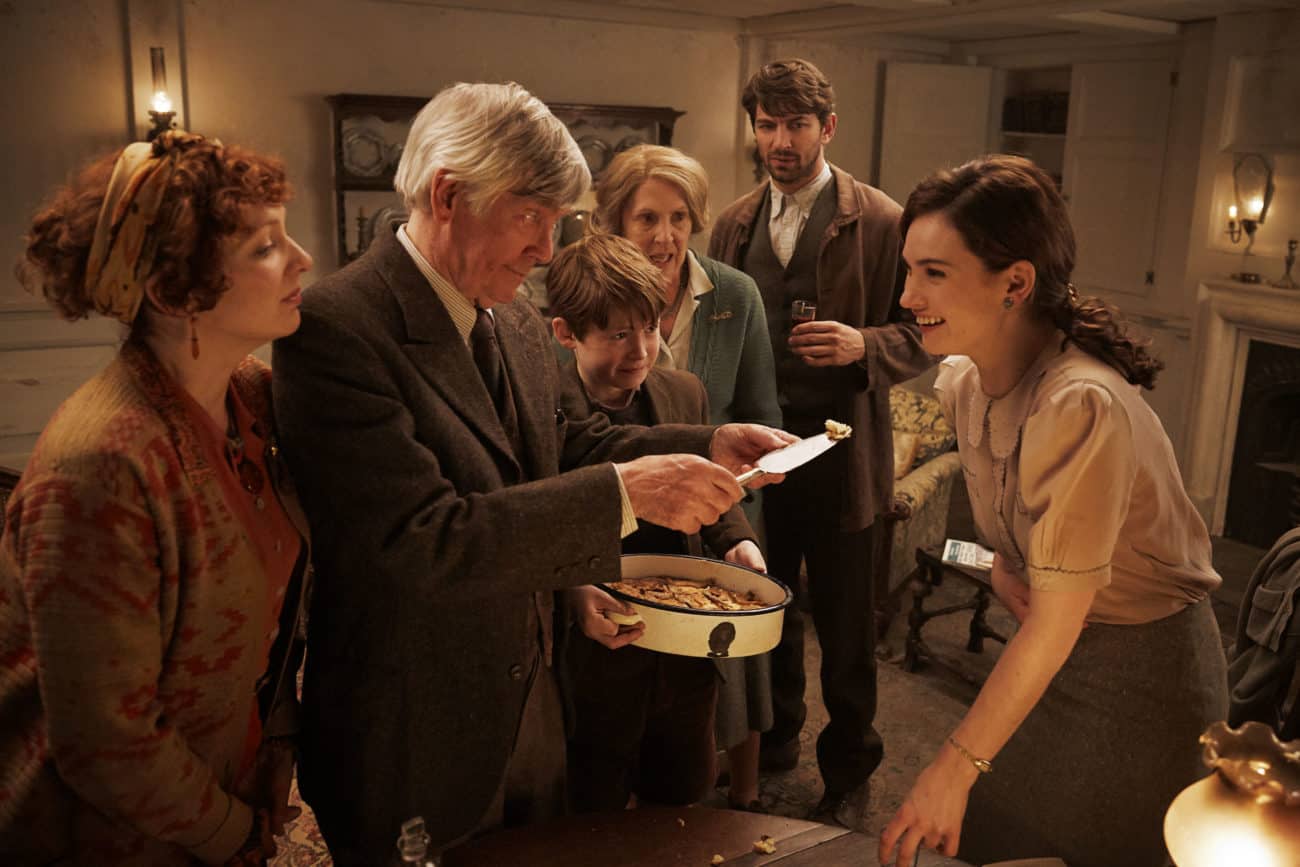Haven’t heard of Guernsey? It’s a very tiny island in between England and France in the English Channel. It’s also the answer to the question: “Are there still more great storied to be told about World War II?” The answer is yes; The Guernsey Literary and Potato Peel Pie Society is a compelling wartime drama about what life what like on the island during that time. I mean, come on, only eating flavorless pies made of potatoes and potato peels. Yuck!
Juliet Ashton (Lily James) is a struggling but relatively successful writer (she does have to use a male pen name) in London, just after World War II. She’s got an American diplomat boyfriend, Mark Reynolds (Glen Powell) and is in the middle of the book tour of her most recent book. She gets a request for a book from Dawsey Adams (Michiel Huisman) on Guernsey. Juliet gives him the book and strikes up a correspondence with Dawsey, who informs her he is a part of a book group: The Literary and Potato Peel Pie Society. Intrigued, Juliet visits the island to speak to this group including Dawsey, the pie creator Eben (Tom Courtenay), gin distiller Isola (Katherine Parkinson), and motherly Amelia (Penelope Wilton). Juliet learns of a 4th member, Elizabeth (Jessica Brown Findlay), who has yet to return to Guernsey for mysterious reasons. Those mysterious reasons draw Juliet into Guernsey life, closer to the Society and further away from London and Mark.
I personally had thought we hit the bottom in terms of European stories about World War II. When George Clooney is dragging art experts to Europe to save the Mona Lisa from Adolf Hitler, you know the well is shallow. However, this movie found a new, VERY interesting spin on the war tale. Guernsey, though connected to the rest of Europe, is still a very isolated, small island. Because of the tiny population and relative stasis of life, this Nazi upheaval is very compelling to behold. We get glimpses of the kids leaving the island first, instantly cutting the population in half…of a small place. Then we see the occupation, and how it turned Guernsey upside down. German men and the island women formed relationships (willingly or not) sometimes for survival, sometimes out of love. Again, because Guernsey is small, these perceived betrayals hit these people hardest of all, cause that’s a neighbor, or a confidant, or a surrogate daughter, etc. The story mentions the Nazis stopped communication from the outside world, further isolating these people in their darkest times for what must have been 4 agonizing years, with a book club the only thing keeping them connected to something good. As heartbreaking and fascinating that occupation must have been, the post war life is just as compelling. Those short term survival relationships could potentially leave kids, or a betrayal of trust, and on a small town, scars like that don’t go away quickly: they endure, potentially for decades. So even though the war ended in Europe in 1945, it was still going on in Guernsey when Juliet Ashton landed there to deliver a book. Each one of those stories could produce a great movie or miniseries, and The Potato Pie Society gives us just enough insight to keep the mystery and story engaging until the very end.
That being said, the reason Netflix bought this story is because of the very adorably British Romantic pentrangle, which is simply not the equal of the war story. This has nothing to do with the acting: Lily James, Glen Powell, Jessica Brown Findlay, Nicolo Pasetti, and Michiel Huisman are dutifully good at looking beautiful, caring, and lovable. But here’s an example of how inequality in story can derail even the best material. I present to you 2 scenes, between two different pairs. In one, we get a tense, but caring emotional breakthrough for one of the society members as she pours out her conflicted feelings about not caring enough for her “daughter” after she made a mistake. In the other, we have Juliet emotionally breaking through to her publicist (Matthew Goode) about how she is worried she doesn’t have the skill to tell the Society’s story. Both scenes are staged and scored to be big emotional moments. Doesn’t the second one seem like absolute trite BS to you? As cute as it is to see good looking lost souls find connections with one another, the people of Guernsey shouldn’t have to again take a backseat to some big city person usurping their amazing tale.
Even though the period piece rom comness of Juliet Ashton’s lovelife threaten to consume the story, The Potato Peel Pie Society is to compelling to be ignored. British stalwart Mike Newell and his host of writers tip the balance enough in the right direction to make the movie stay with you long after. Plus, he shows us just how majestic Guernsey is, so much so that I actually looked up how much it would cost me to go visit there. I don’t have $4,440 to spare, but I thought about it for a second, which is a testament to Guernsey’s Lieterary and Potato Peel Pie Society and their amazing story.

